Trade for Peace
TRADE for PEACE
How the DNA of America, Freemasonry, and Providence Created a New World Order with Nobody in Charge
Foreword by Professor J. Brian Atwood
Humphrey School of Public Affairs
University of Minnesota
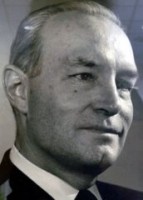 In 1949, Harlan Cleveland (left), a leading Marshall Planner, coined a phrase, “revolution of rising expectations,” to describe the demand side of international development after World War II. Prior to his involvement with the Marshall Plan for European recovery, Cleveland—a Princeton graduate and a Rhodes Scholar—served as director of the China Aid Program, managing U.S. aid in eight East Asian countries. A practitioner, philosopher, and academic leader (he was dean of the Maxwell School of Citizenship and Public Affairs at Syracuse University, founding dean of the Hubert H. Humphrey Institute of Public Affairs at the University of Minnesota, and president of the University of Hawaii), Harlan Cleveland captured the primary challenge for American leadership in the post-war period. The best reflection of that was President Harry Truman’s Point Four Program and his commitment to the world’s poorer nations.
In 1949, Harlan Cleveland (left), a leading Marshall Planner, coined a phrase, “revolution of rising expectations,” to describe the demand side of international development after World War II. Prior to his involvement with the Marshall Plan for European recovery, Cleveland—a Princeton graduate and a Rhodes Scholar—served as director of the China Aid Program, managing U.S. aid in eight East Asian countries. A practitioner, philosopher, and academic leader (he was dean of the Maxwell School of Citizenship and Public Affairs at Syracuse University, founding dean of the Hubert H. Humphrey Institute of Public Affairs at the University of Minnesota, and president of the University of Hawaii), Harlan Cleveland captured the primary challenge for American leadership in the post-war period. The best reflection of that was President Harry Truman’s Point Four Program and his commitment to the world’s poorer nations.
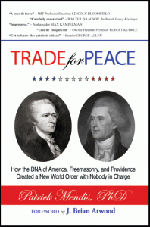 In Safire’s Political Dictionary, William Safire credits Harlan Cleveland for his original thinking on the nature of post-War socioeconomic development in Europe and Asia. Safire defines Cleveland’s “revolution” in broader terms: “unrest caused by extravagant promises; or, the constructive desire for change based on an optimistic view of society’s future; or, the increased demand for a high standard of living that comes when the media bring evidence of others’ affluence into poor people’s homes. The U.S. Ambassador to the United Nations, Adlai Stevenson, who worked closely with then Assistant Secretary of State Harlan Cleveland under President John Kennedy, spoke frequently about America’s role in responding to the revolution of rising expectations.
In Safire’s Political Dictionary, William Safire credits Harlan Cleveland for his original thinking on the nature of post-War socioeconomic development in Europe and Asia. Safire defines Cleveland’s “revolution” in broader terms: “unrest caused by extravagant promises; or, the constructive desire for change based on an optimistic view of society’s future; or, the increased demand for a high standard of living that comes when the media bring evidence of others’ affluence into poor people’s homes. The U.S. Ambassador to the United Nations, Adlai Stevenson, who worked closely with then Assistant Secretary of State Harlan Cleveland under President John Kennedy, spoke frequently about America’s role in responding to the revolution of rising expectations.
Since I joined the Foreign Service forty years ago—spending most of my professional life in international development, trade and foreign affairs—I have appreciated our nation’s need for more cooperation and partnership to deal with growing global problems. While serving as Administrator of the U.S. Agency for International Development and Chairman of the Overseas Private Investment Corporation, I saw the need for a culture of proactive diplomacy, strong interagency coordination to prevent crises, and sound long-term international development investments to address the developing world’s growing expectations. In an increasingly interdependent world, it was clear we needed every instrument—the United Nations in particular—to prevent further violence and terrorism. A strategy of prevention requires a combination of public diplomacy, development assistance, and deterrence. We created the United Nations and the Bretton Woods Institutions: the World Bank, the International Monetary Fund, and the regional development banks. Even these political, development, and financial institutions could not prevent the recurrence of violent conflict. Cleveland would say that the world is a better place because of the development investments we made through bilateral and multilateral institutions, but, as he would acknowledge, the debate goes on. Recently, two books have captured the attention of realists and idealists: The White Man’s Burden by former World Bank economist, William Easterly, and The End of Poverty by Jeffrey Sachs. Cleveland would come down on Sach’s side of the debate as he was the optimist, but he would not have ignored Easterly’s critique.
Cleveland had, for many years, called for American leadership to translate global interdependence into an agenda for action to solve international problems. To manage interdependence effectively, he advocated that following the League of Nations and the UN, we should have a “third try” in creating a new world order. Cleveland had always maintained that advanced technology, American leadership, and global partnership would make the “third try” the most effective yet in dealing with “rising expectations,” and global challenges. He knew that, in a world of global communication, the American dream would be unevenly desirable.
Patrick Mendis, an award-winning alumnus of the Humphrey Institute and a protégé of Harlan Cleveland during his tenure as dean, describes the “third try” and the concept of rising expectations through a unique dimension of American history. His journey is a relevant one, from a mud house with water buffalos in Sri Lanka to working with the United Nations, the World Bank, and the U.S. Government. Mendis’ personal experiences give him a unique perspective on America’s mission in the world.
We share the experience of having been exchange students as part of the AFS Intercultural Program. I now chair the Board of Trustees of this organization started by World War II ambulance drivers. Today, it is a partnership of some 60 countries with over 13,000 student participants. More than 325,000 individuals and an equal number of host families have had the AFS experience. I was an exchange student in Luxembourg, while Mendis came to Minnesota to attend high school in 1978. He met his American wife, a former AFS exchange student from Minnesota to Japan, at a Humphrey Institute workshop taught by Harlan Cleveland. At his graduation ceremony in 1986, he received the first Hubert Humphrey Award for Outstanding Leadership. Dean Cleveland said at the time:
He was born in Sri Lanka, and had his early education there; he is now a U.S. citizen. In Sri Lanka, Patrick achieved First Class Honors on his business administration degree in a British system that is typically stingy with Firsts. His language skills, as well as his cross-cultural understanding, were honed by an experience of living and going to school in northern Minnesota, living with a family and in a community for which he retains both love and loyalty.
A frequent visitor to the Humphrey Institute (he considers Minnesota his “home”); Patrick Mendis and I have discussed the relationship between the Founders’ vision and the values that are reflected in American foreign policy. Learning of his work with Senator Rudy Boschwitz, I once told him that there is a piece of unfinished business in our Constitutional design: the Constitution does not permit people like Rudy Boschwitz, Madeleine Albright, Henry Kissinger, and Arnold Schwarzenegger the opportunity to run for the presidency because of their foreign birth. Patrick Mendis falls into the same category. He may not aspire to run for president, but his writings leave no doubt that he is a very proud American who has internalized the Founders’ vision.
In this book, Mendis advances the notion that the “third try” is already underway in the form of the World Trade Organization (WTO)—a rule-based global trading system. He traces the origins of the international organization to the “commerce clause” of the U.S. Constitution. He cites the Federalist Papers and other writings of the Founding Fathers to show that the United States was conceived with “commercial providence,” a phrase found in George Washington’s “Providential Agency.” In addition, Mendis quotes Thomas Paine, who also predicted that “trade will always be a protection.” In his book, he puts forward a pertinent question:
Is the unparalleled economic prosperity of the American people, who represent only five percent of the world population but actually consume twenty-five percent of global resources, associated with divine intervention, or commercial providence?
Mendis argues that Adam Smith’s The Wealth of Nations and The Theory of Moral Sentiments paved the way for Alexander Hamilton and Thomas Jefferson to postulate their realist and idealist worldviews. These two contradictory traditions are reflected in the realist orientation of Jamestown’s colonists and the spiritually-inspired idealists who settled in Plymouth. Mendis maintains that the duality of American character and its embodiment, which he calls “Mercurial personality,” is appropriate for dealing with the revolution of rising expectations.
Observing his mentor’s seven attitudes of leadership, Mendis confirms “the feeling that crises are normal, tensions can be promising, and complexity is fun.” Like Cleveland, Mendis believes that our Madisonian system of checks-and-balances is meant to generate creative tensions, which produce innovation and tolerance, both are attributes in a competitive globalized world.
Despite the philosophical tensions between Jefferson and Hamilton, George Washington kept the republic unified. Mendis believes that the rule-based WTO is an extension of America’s democratic and republican ideals – the “third try” to create a new world order. This book asserts that the Founding Fathers’ “global project” is still an unfinished work (as is the WTO’s Doha Round and its Development Agenda).
This highly readable synthesis, whose main theme derives from the Constitution’s preface, pleads for a rethinking of the American role in global leadership. For those who are interested in American foreign and trade policies, this work connects the dots from the Founding Fathers’ global vision to the global marketplace within which America competes today.
 Professor J. Brian Atwood
Professor J. Brian Atwood
Dean, Humphrey School of Public Affairs
University of Minnesota
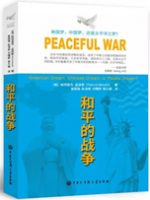
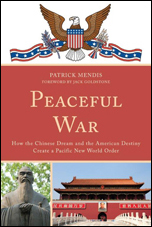 Peaceful War
Peaceful War
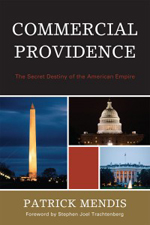 Commercial Providence
Commercial Providence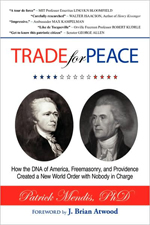 Trade for Peace
Trade for Peace
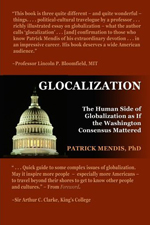 Glocalization
Glocalization